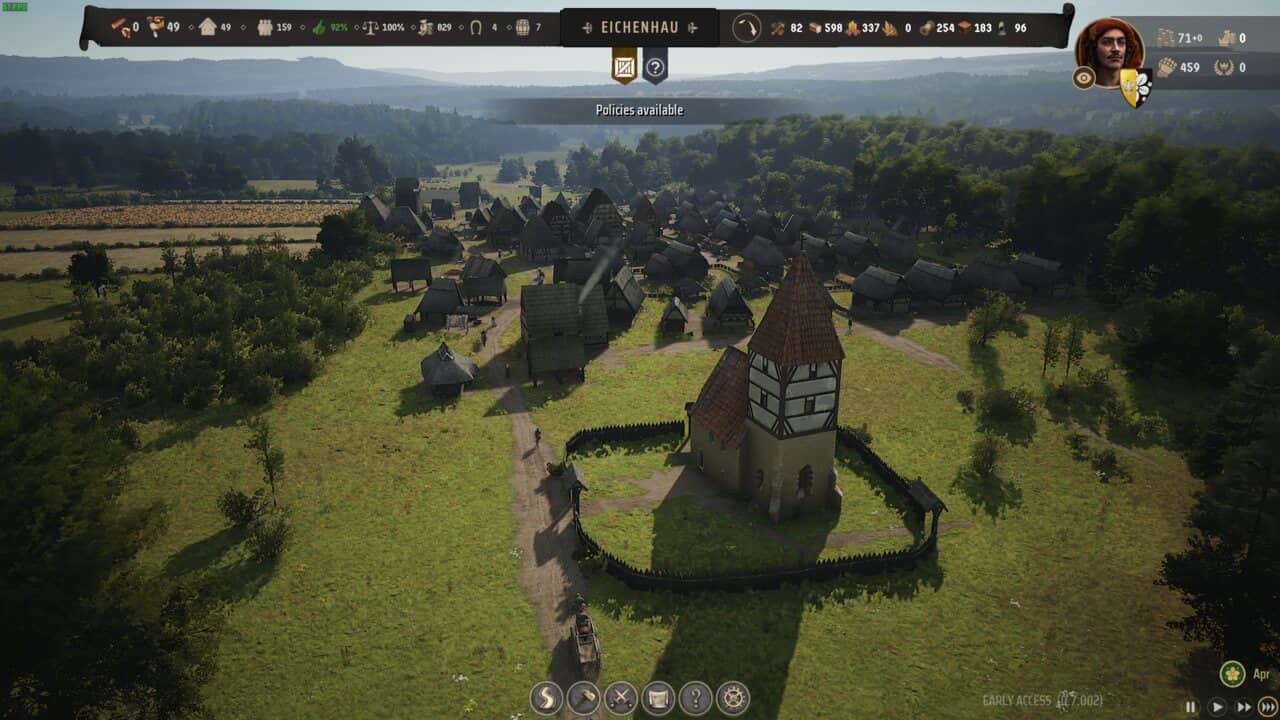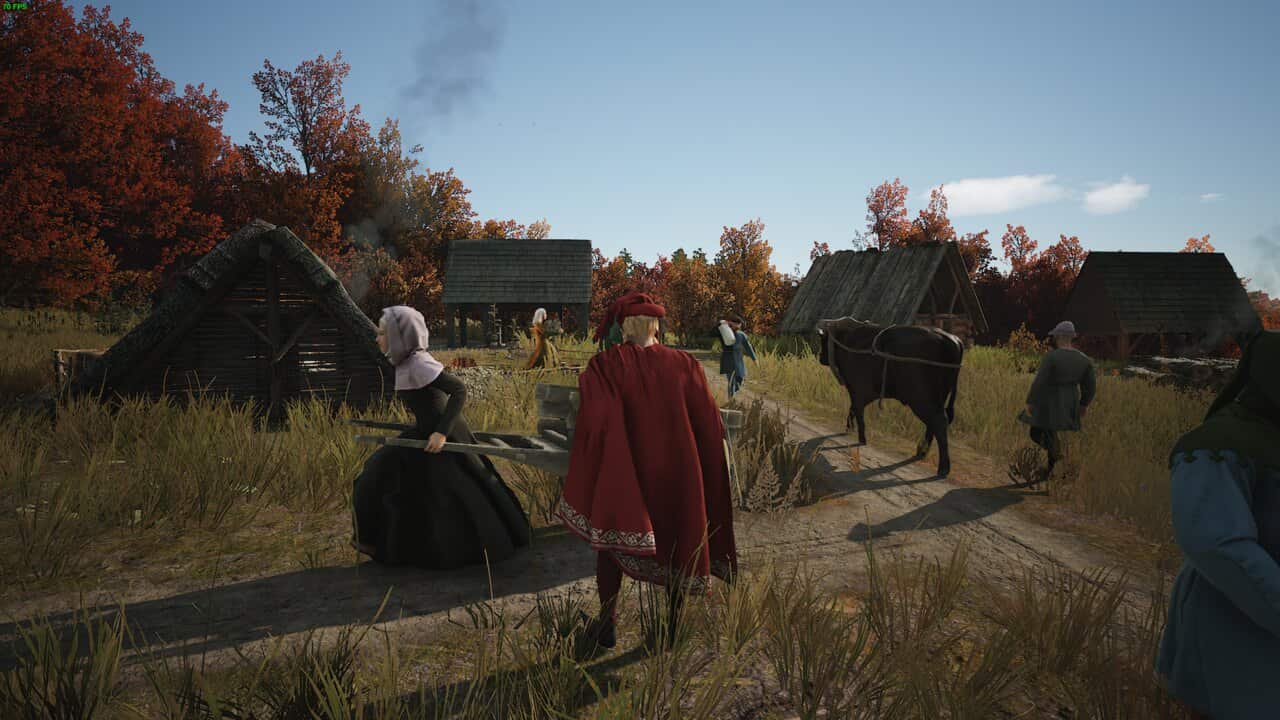You can trust VideoGamer. Our team of gaming experts spend hours testing and reviewing the latest games, to ensure you're reading the most comprehensive guide possible. Rest assured, all imagery and advice is unique and original. Check out how we test and review games here
The city builder genre is having a bit of a moment. Frostpunk 2 and the promising Synergy are looming on the horizon. Laysara: Summit Kingdom surprise launched earlier this month. Farthest Frontier is percolating away nicely in Early Access, and Dorfromantik’s tile-based delights still stand up nearly two years on from release. In comes Manor Lords, Early Access warts and all, one of the most wish-listed games on Steam.
Set in the feudal ages, Manor Lords is your typical city-building fare. You take on the role of an omniscient architect, city planner, and military strategist, all bundled in one – the lord of the manor. As it tasks you with stripping the feudal wilds for resources, establishing sophisticated production chains, and erecting a more-or-less self-sustaining settlement, Manor Lords basks in this rather unique, cosy complexity.

There’s none of the morality-testing heft or the creeping urgency of Frostpunk, but rather Manor Lords’ intricacies lie in juggling all its moving parts – fuel and food needs, villager approval, trade, building placement, taxation, seasonal changes, and belligerent bandits – in a gradual, intentional fashion. Plopping down dozens of buildings and hoping for the best won’t work here. Instead, it’s all about micromanaging construction, upgrades, population growth, and a limited workforce, fast-forwarding and slowing time until you crack what is a living, breathing Petri dish of a puzzle.
The formula isn’t perfect. Whether a bug or intentional, having vast stockpiles of resources, often fuel, and not seeing them distributed is frustrating. I spent ages swapping storage, burgage plot (Manor Lords’ take on the house), and marketplace placement while maxing out the workforce to ensure fuel was distributed to all plots, only for the problem to never quite go away. There’s almost a reluctance to grow bigger after finding that elusive balance for fear of it all collapsing. But graduating from a cluster of tents to a bustling town delivers the type of satisfaction found only in the best city builders.
“Manor Lords all about micromanaging construction, upgrades, population growth, and a limited workforce, fast-forwarding and slowing time until you crack what is a living, breathing Petri dish of a puzzle. “
Manor Lords is a slow burner, even by city-building standards, but without ever feeling sluggish or inflated, a feat given that city builders have always had a knotty relationship with retaining attention spans beyond the fickle novelty-carried draw of the first few hours. Manor Lords doesn’t divert from genre norms and patterns and is, in some ways, trammelled to convention, but it’s anchored in a cold and inflexible realism, an intricate chain reaction of interlocking cause and effect that makes it stand out. You need this building to gather that resource to produce this crafting material to create that commodity, and so on. The world of Manor Lords is one that rewards efficiency rather than aesthetic town layouts. There are no orcs, ghouls, or fantastical asides. It’s the grim reality of people going hungry when drought sets in or turning to banditry when their needs aren’t met.

Lord of the manor
It helps that Manor Lords is a bit of a looker, and performance keeps up. Its maps are gorgeous and loaded with detail, morphing in real-time in response to your actions as your settlement expands or you hack through forests. As winter comes, snow carpets the land. Make it through the gushing greens of spring, and you can almost feel the summer sun’s hot sting. It’s a testament to the harshness of feudal life and hammers home that Manor Lords is very much a game of seasons. Winter is bleak; seasonal berry deposits go dormant, wheat fields are layered with frost, and, though just an impression, villagers appear to move slower. Spring and then summer can’t come soon enough.
While the core focus is very much on building, Manor Lords chucks in real-time warfare, a stripped-back and condensed take on the RTS genre. It’s no Age of Empires, but nor is it Total War, acting as a fast-paced pause from the measured, meticulous demands of city building. There’s some strategy involved, namely in formations, attack stances, fatigue, morale, and equipping militias with the right gear, but victory is usually dependent on numbers rather than tactical supremacy. You never feel like your settlement exists solely to gear up and feed an army for military conquest, a beckoning, slippery slope so many genre-adjacent games tumble down. But, conversely, your settlement’s long-term survival wages on having the forces to clear out bandits camps and sate expansionist goals, which are never thrust on you, but there as an option. It’s a clever balance that serves Manor Lords well.

There’s always a certain disconnect in city builders between you as overseer and the citizens you serve. Rarely are you asked to worry about them as individuals other than communal grumbles of discontent or detached pop-up messages warning of famine or death. They often become no more than faceless cogs in the grand urban edifice. Manor Lords is no different in that respect. If anything, it’s worse. But its third-person mode lets you survey your work up close and stroll through mud-caked lanes, helping forge a more tangible bond with your villages as you watch them dart here and there, chirping trivial nonsense (there’s one recurring line about a guy losing his nipple) and completing tasks you’ve assigned. It’s purely cosmetic, but it does help you care a bit more about your settlement, adding a touch of the personal to the most bureaucratic and numerical of genres.
The signs of Early Access are on show, as expected. Work-in-progress messages pepper the tech tree, tooltips hint at minor features that don’t quite exist yet, and diplomacy is in an embryonic form. There are some minor bugs, none of them game-breaking though. Following a bandit raid that flattened half my settlement, I bulldozed several plots only for a permanent ghost supply stash to plant itself into the ground, preventing the construction of new buildings. The three scenarios on offer are rudimentary, offering up vague win conditions and little in the way of story. After 50 hours it’s hard to escape the sense that you’re spinning logistical plates, as enjoyable as that is, without any genuine end goal. I’d hoped to see more historical context or narrative dressing to anchor the game. That may come later. But what’s there is impressive and nearly full-formed, confident in what it’s trying to achieve. Early Access is often a promise of what’s to come; Manor Lords already delivers on that promise.
Reviewed on PC. Code provided by the publisher.


